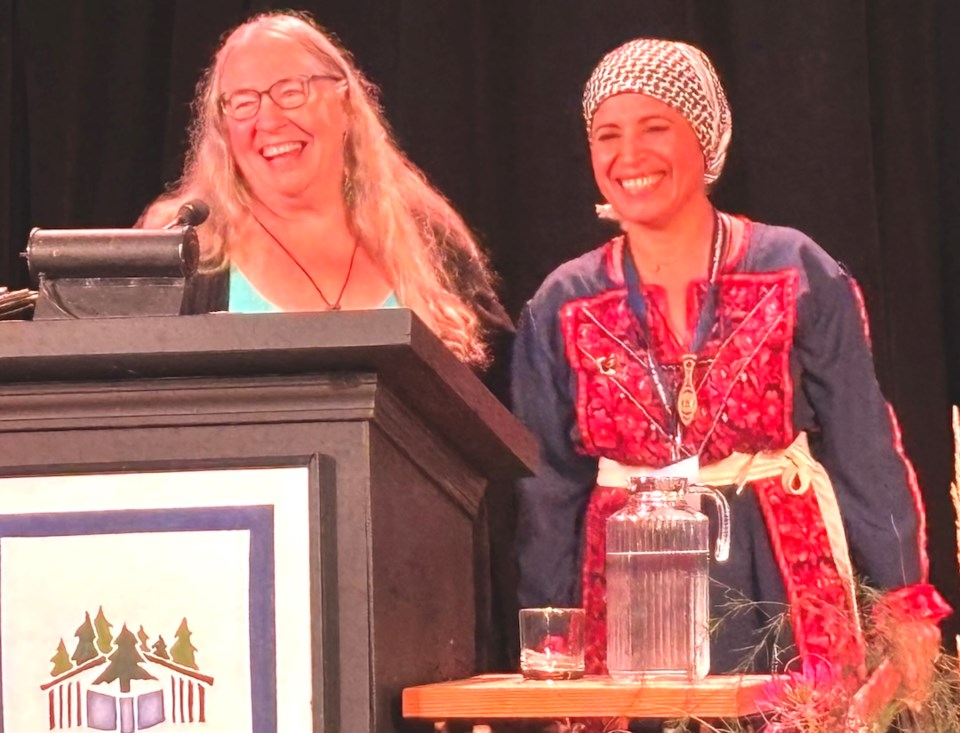The most dramatic ovation of the 42nd annual Sunshine Coast Writers Festival — which drew hundreds of literary devotees to Sechelt last weekend despite a vigorous cloudburst and a nation-wide airline strike — went to an author who demanded justice for people on the opposite side of the world.
And people equipped to provide transformative leadership were right in the room, explained Amal Elsana Alh’jooj, who was raised in the Indigenous Bedouin community within Palestine. Specifically, women.
“Look at the world,” urged Alh’jooj. “Look at what’s happening, when led by men. I’m excluding those men who believe in our cause as women. You are welcome to join us today. I have nothing against you.”
Alh’jooj is an associate professor in the department of social work at McGill University in Montreal. She was a 2006 nominee for the Nobel Peace Prize and founded the Arab-Jewish Centre for Equality, Economic Empowerment and Cooperation, which works in the Negev desert region of southern Israel.
Despite her decades of advocacy and activism for the betterment of Palestinian populations, Alh’jooj said that the latest attacks on Gaza have left her with physical pain.
“I’m standing with deep sorrow experiencing the ongoing genocide in Gaza,” she said. “I lost 47 of my family. I lost my close colleague and beloved friend, Vivan Silver, on October 7 [as part of the Be’eri massacre in 2023]. And more than 370 Palestine doctors and hundreds of activists were killed and lost their lives standing fighting for justice and peace. I realize that it’s very easy to lose yourself in that pain. And I have to translate that pain into something that will provide hope.”
Alh’jooj’s debut memoir, Hope is a Woman’s Name: My Journey as a Bedouin Palestinian Activist in Israel, takes its title from her own name, which signifies hope in the Arabic language.
Alh’jooj noted that she has been criticized by the Bedouin and Muslim community members due to her outspoken advocacy for women’s rights. Some accused her of simply importing Western ideals. Her emphatic rebuttal: the ideas that fire her spirit stem directly from her mother and grandmother. “The first time I heard about freedom and women’s liberation, it was my grandmother who taught me,” she recalled. “She told me, the free woman has nothing to fear, and I learned this from her.”
As a youth in the Bedouin community, she received instruction to become a shepherdess. But she didn’t care for the sheep’s unthinking obedience. She preferred the obstinacy of goats. “I liked the goats because they never knew the boundaries of our land and the other tribes’ lands,” she said. “And by crossing [boundaries], they brought me to new destinations. By crossing, they brought me to meet with other tribes. By crossing, goats taught me how to be brave.” It led to advice that she gives her students at McGill: “Enough of the sheep. Be goats.”
Alh’jooj directed an impassioned rebuke to Canada for its response to the humanitarian crisis in Gaza. “People look at me in a way that says, ‘We love Canada. You are the champion of human rights.’ But where are we today? We didn’t even send one plane to take injured Palestinian kids to Canadian hospitals. Is it that difficult? Where is Canada? Where are the people? We think that by killing as much as we can, we get rid of terrorism. But we are breathing into it.”
Justice for Indigenous communities in Canada was also a major theme of the festival, as authors like Bruce McIvor (Indigenous Rights in One Minute), David A. Robertson (52 Ways to Reconcile), and novelist Brian Thomas Isaac (Bones of a Giant) explored the impact of governance, legislation and communities shaped by colonial legacies.
Alh’jooj’s presentation was sponsored by the Restorative Justice Program of the Sunshine Coast. “Amal’s book broadens the lens for us as human beings in this place we call home,” said Nancy Denham, the program’s trainer, facilitator, and Circle Keeper. “Particularly in the swiya upon which we live and play and work and love one another. Thank you for answering the call to come, to share your experiences of hope.”



